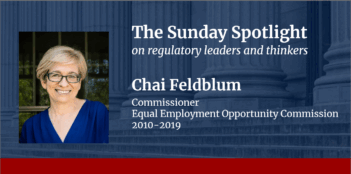
An upcoming U.S. Supreme Court case may change the landscape of gender-affirming care regulations.
In United States v. Skrmetti, the U.S. Supreme Court has agreed to decide whether a Tennessee law restricting gender-affirming care for transgender youth violates the Equal Protection Clause of the U.S. Constitution. The law prohibits health care providers from administering medical treatments or performing procedures that assist a minor in identifying with “a purported identity inconsistent with the minor’s sex.”
Challenges to similar laws are pending in courts across the country.
Gender-affirming care refers to a broad category of social, psychological, behavioral, and medical interventions intended to support the gender identity of transgender and nonbinary individuals. These interventions include changes to hair styles, names, or pronouns; mental health therapy; puberty blockers; hormone replacement therapy; and gender affirmation surgery. The permanence of gender-affirming care varies with the type of treatment: Surgery is irreversible, whereas hormone therapy is partially reversible and puberty blockers are reversible.
As knowledge of transgender and nonbinary youth’s experiences evolves, political controversy remains concerning what types of gender-affirming care should be available to minors.
In one report, the U.S. Department of Health and Human Services (HHS) explains that access to gender-affirming care improves transgender youth’s quality of life, allowing them to build self-esteem and explore their gender identity as they grow up. A recent study found “a significant relationship” between transgender youth’s access to hormone therapy and decreased rates of depression and suicide.
Skeptics of adolescent gender-affirming care may worry that transgender or nonbinary youth will come to regret decisions they made about what gender-affirming care to receive and will want to detransition. One therapist argues that there is a lack of scientific evidence supporting the benefits of gender-affirming care. Others advocate limiting the scenarios in which a minor can access irreversible gender-affirming care.
The Cass Review—a controversial report on gender-affirming care for minors—is often used to justify gender-affirming care restrictions. Supporters of gender-affirming care availability urge legislators to avoid basing restrictions on this report, as it “obscures key findings, misrepresents its own data, and is rife with misapplications of the scientific method.”
Furthermore, most research suggests that the percent of transgender youth who detransition is small and the percent of those who regret past gender-affirming care decisions is even smaller. Some human rights activists argue that allowing puberty to progress in a minor experiencing gender incongruence is also harmful and irreversible, so youth should be allowed to make transgender health care decisions.
Medical associations across the world have released standards for transgender health care aimed at balancing the importance of allowing transgender youth to express their gender identity with the need to protect youth from prematurely making permanent decisions. For example, the World Professional Association for Transgender Health recommends limiting gender-affirming medical treatments to situations in which the minor meets diagnostic requirements for gender incongruence, has experienced marked gender incongruence for an extended period of time, demonstrates emotional and cognitive maturity, and provides informed consent after being told the permanent and long-term effects of the treatment.
In the United States, federal and state governments regulate gender-affirming care. At the federal level, the U.S. Food and Drug Administration (FDA) approved hormone therapies for certain conditions, such as treatment of menopause, but not specifically for gender incongruence. Although hormone treatments can be prescribed for off-label use, those in support of FDA approval argue that it would increase access to, and insurance coverage for, gender-affirming hormone therapy. Recently, FDA met with the Research Institute for Gender Therapeutics about a proposed gender-affirming care development program geared toward eventual FDA approval.
Under the Biden Administration, HHS revised provisions in the Affordable Care Act to strengthen protections against discrimination by health care providers and insurance companies based on one’s gender identity. The HHS rule prohibits providers from denying or limiting insurance coverage for gender-affirming care when the restriction is based on the insured’s sex assigned at birth or gender identity. Legal challenges, however, have prevented the rule from taking effect.
While federal regulation of gender-affirming care trends toward increasing access, 24 states ban or severely limit access to gender-affirming care for minors. Providers in these states who offer such care face a range of penalties, including criminal charges or loss of a medical license. Iowa, for example, allows third parties and the state attorney general to sue doctors who provide gender-affirming care.
Other states without bans have released assessment criteria that physicians must follow for state Medicaid programs to cover gender-affirming care for minors. For example, the Maryland Department of Health requires a multidisciplinary care team—including mental health professionals—to obtain parental consent and to document that the care is medically necessary.
Most U.S. medical associations—such as the American Medical Association, the American Academy of Pediatrics, and the American Psychological Association—criticize bans on gender-affirming care. The American Medical Association opposes what it views as a “dangerous intrusion of government into the practice of medicine and the criminalization of health care decision-making.” It further explains that evidence-based gender-affirming care is often medically necessary.
Regardless of what the Supreme Court holds in Skrmetti, Nick Hafen, Head of Legal Technology Education at Brigham Young University J. Reuben Clark Law School, explains that the implications of this decision will extend beyond Tennessee’s gender-affirming care ban. A decision in favor of the United States could incorporate transgender and gender-diverse individuals as a constitutionally protected class, Hafen argues. He predicts that a decision favoring Tennessee would likely end legal challenges to bans across the country.
The American Civil Liberties Union warns that Skrmetti will test how far the Supreme Court will permit states to ban allegedly controversial forms of health care. It argues that if the Court decides that gender-affirming care bans do not violate the Constitution, the decision could empower states to limit reproductive health care further, including access to abortion, in vitro fertilization, and birth control.



